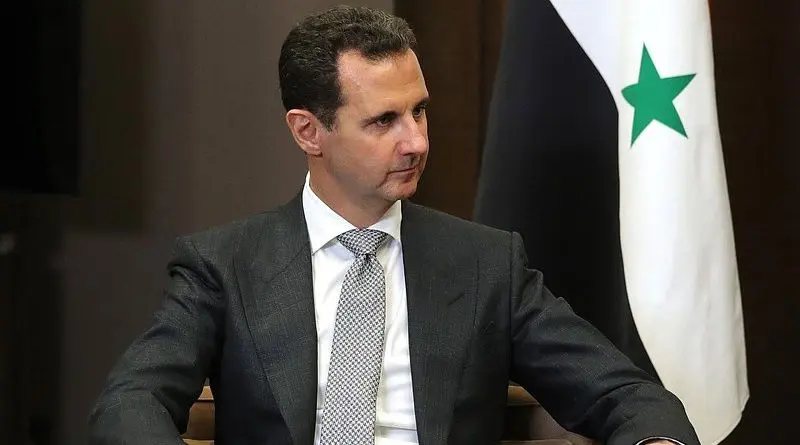Syria: Failure To Stop Assad’s Aid Abuses Threatens Entire Region
By Arab News
By Ephrem Kossaify
Syrian authorities have grown more skilled at manipulating international aid during 11 years of conflict, according to a newly published report by the Center for Strategic and International Study, an independent think tank in Washington.
It said that the regime of Syrian President Basher Assad has turned billions of dollars in foreign assistance, intended to alleviate the suffering of the Syrian people, into a lasting “profit center” used to reward loyalists and punish the opposition.
The 70-page report, titled Rescuing Aid in Syria, states that those who are benefiting from international aid to the country are the same people who created the humanitarian crisis in the first place. It is based on interviews with 130 UN officials, aid workers, analysts, diplomats, field monitors and mediators involved in the Syrian conflict.
They said the Assad regime has tightened its grip on aid agencies in a number of ways, including through visa approvals, and is diverting assistance for its own gain in the areas it controls and restricting international access to areas it does not.
It also threatens, tortures and arbitrarily detains Syrian aid staff and withholds basic goods and services, including food and clean water, from millions of Syrians in rebels-held areas as a tactic of war, the report added.
Failure to reverse this damage could push the entire region to the brink of despair, it warned, as it called on Western donor governments to break the cycle of abuse — and do it soon as time is running out.
Syria is at a turning point, according to the report, with the number of vulnerable people in need rising amid a tacit acknowledgment that Assad will remain in power and a push, mostly by regime ally Russia, to move to a reconstruction phase, without any reforms to humanitarian assistance and without addressing any of the myriad issues affecting the country, including displacement.
Aid advocates fear that more international money will be used as a weapon of war by the regime.
“For a long time, diplomacy has stalled and aid has been used essentially as a containment strategy by Western governments, or even just kind of a pat on the back, to think they’re doing something for one of the world’s worst humanitarian and displacement crises since the Second World War,” report author Natasha Hall told Arab News.
“With rising needs and with no end in sight, really, to the core causes of the conflict, if the international community decides that aid and diplomacy is the way forward for Syria then we need to essentially start treating it like it’s the main course.”
Since the start of the war, western donor governments — the EU, the US and Canada — have sent more than $40 billion in aid to Syria. Billions more continues to make its way to the country. Yet despite 11 years of generous payments, every part of Syria continues to suffer and for millions of people life feels ever more hopeless.
More than 12 million Syrians now struggle to find a meal, with the number increasing by 50 percent between 2020 and 2021. Water shortages and a prolonged drought have led to depleted wheat harvests, and had a devastating effect on the livelihoods of millions and exacerbated food insecurity across the country.
In the government-held northeast, people are moving to camps for displaced persons not to flee fighting but to escape poverty and hunger. Children increasingly are suffering from stunted development. A coordinator with one nongovernmental organization said its workers are reporting alarming malnutrition figures.
“If the borders were opened tomorrow, millions more would spill across, fleeing relentless insecurity, hunger and a devastating drought,” the report warns.
The Assad regime has a long history of facing accusations that it is manipulating foreign aid. It is accustomed to working with international NGOs and UN agencies, dating back to when it oversaw the Palestinian and Iraqi refugee crises.
When pro-democracy protests began in 2011, therefore, the regime “pretty much off the bat knew how to establish their own red lines, so they ensured the Syrian Arab red crescent would be the primary implementer and deliverer of all aid,” said Hall.
“They also threatened and co-opted and surveilled international aid workers that were talking out or talking too much about manipulation, diversion, the hampering of aid delivery. Those were PNG’d (declared persona non grata) and thrown out of the country. In this way, they were able to essentially control the aid apparatus. But today it is a bit more insidious.”
Hall said the regime is deliberately starving opposition-held areas while food and other life-saving essentials are left sitting in warehouses, and refusing to allow opposition-linked NGOs to distribute aid.
She called on Western donor governments to break the cycle of abuse through a coordinated, comprehensive and informed approach that includes independent monitoring. Only these governments have the power to do this “because they are the donors,” Hall said, given that the Syrian regime “impedes monitoring when it wants and needs to,” and the threat of coercion and murder that hangs over aid workers has prevented UN agencies from monitoring aid.
“I think it’s time to assess if aid is helping the people that are actually in dire need and if it’s not, then who is it helping?” she said of the challenge facing Western donors as talk continues about opening Syria up.
Neglecting to address this question, Hall added, will affect not only Syria but spill over to the wider region. The sight of desperate Syrians fighting in Nagorno-Karabakh or Libya, or Daesh cells forming and striking, can already be seen.
“Frankly within this kind of soup of instability, you add (Daesh) to the mix, you have the potential for black swan events to occur at any point,” she added, referring to a name for unpredictable events that are beyond what is normally expected of a situation and can have potentially severe consequences.

